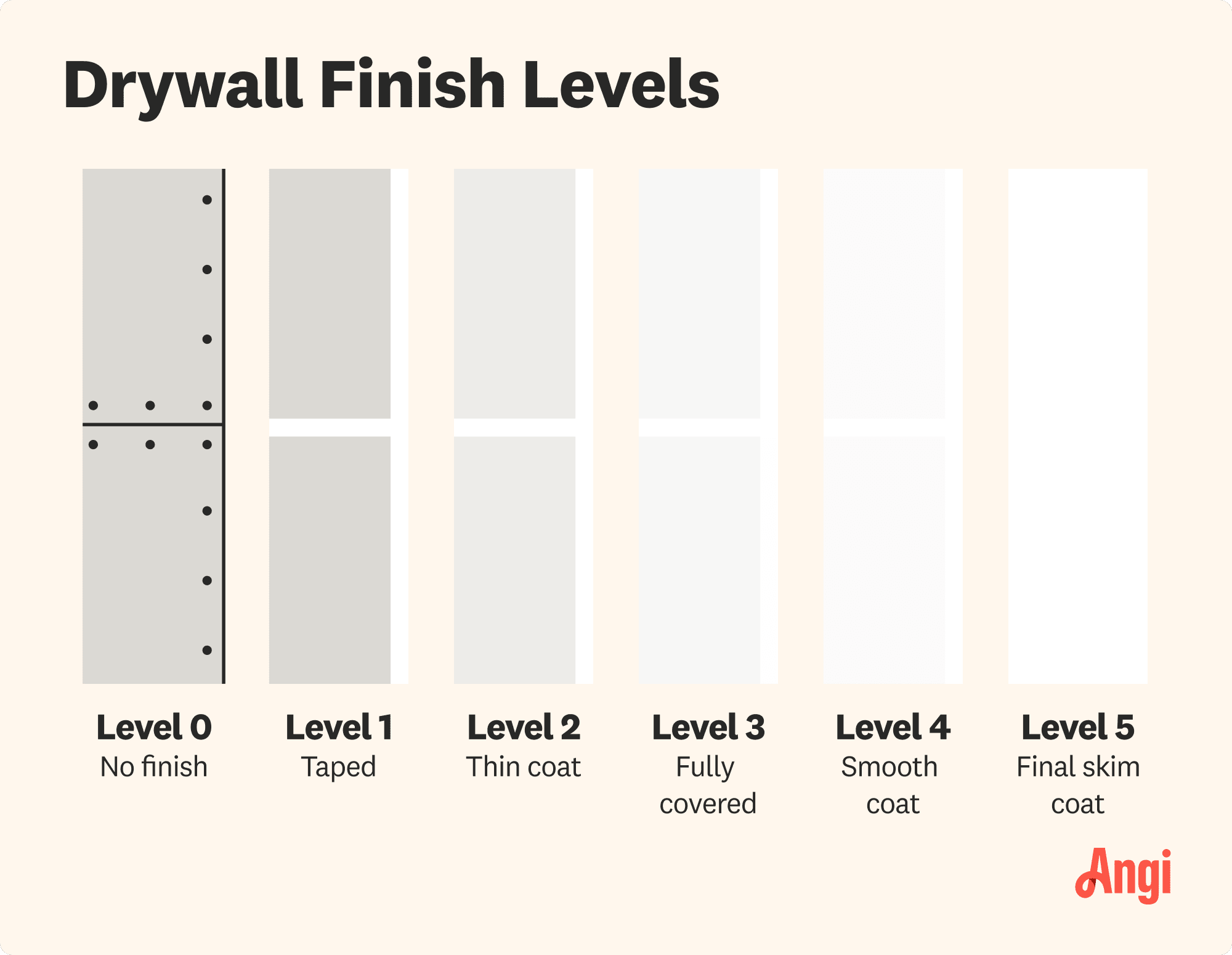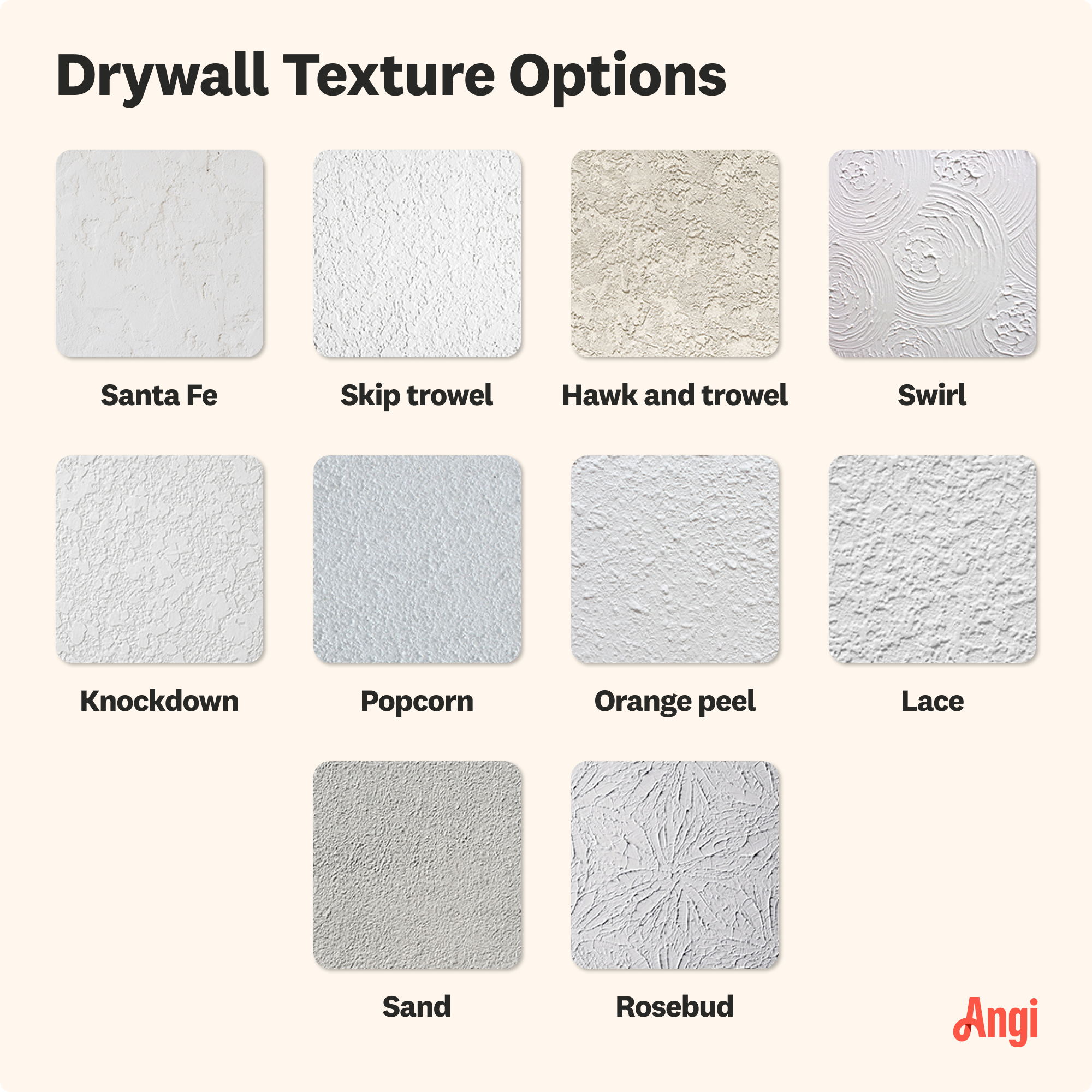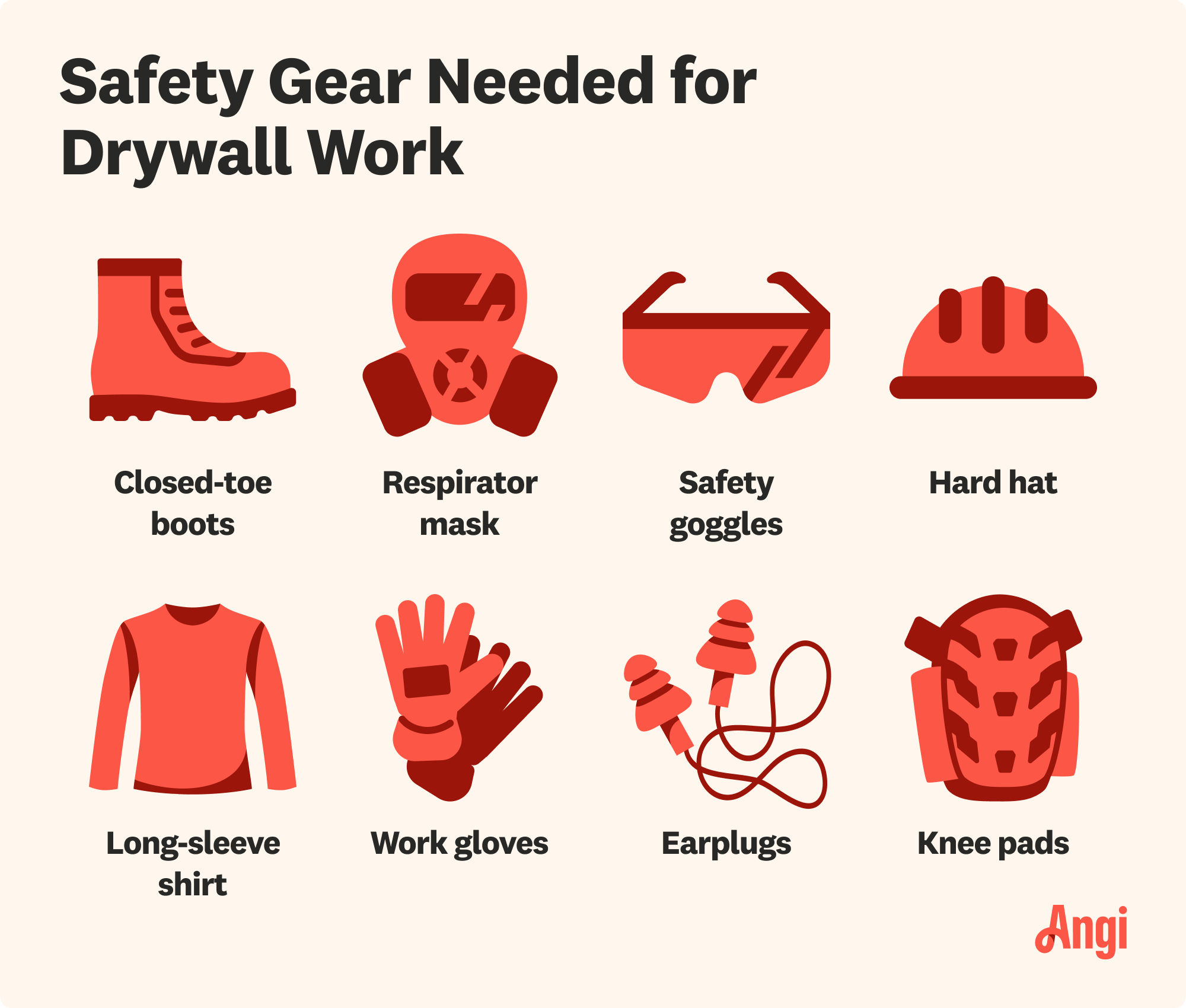
Drywall texture can create an attractive finish and add dimension to your home’s walls. This guide breaks down the factors that influence the cost to texture drywall.
Drywall service costs depend on your project and location. Check with a local pro for your specific job.
The average cost to install drywall, including materials and labor, runs $1.50 to $3 per square foot.
On a per-panel basis, drywall installation typically costs $60 to $90 each.
Installing drywall in a small bathroom of about 100 square feet generally totals $400 to $650 per room.
Labor makes up roughly 70% of the total cost, with drywall installers charging about $1 to $2.10 per square foot.
Adding texture to drywall increases costs by about $1 to $1.95 per square foot, depending on the texture type.
The average cost to install drywall includes materials and labor and runs between $1.50 and $3 per square foot. That equates to about $60 to $90 per drywall panel. The drywall thickness, the type of drywall, and other factors can influence what you'll pay. Total drywall installation costs can range from $987 to $3,218 for the whole project, with an average price of $2,102. Learn all the cost factors and what to consider to get an accurate estimate for your drywall installation job.
Whether you’re working on a small bathroom or a spacious living room, having an estimate of costs based on room size can help you plan your budget more effectively. Installing drywall in a small bathroom of around 100 square feet will cost $400 to $650, while for a large living room, it can range from $1,500 to $3,000.
Here’s a chart that gives the average costs for installing drywall—including materials and labor—in different common room sizes:
| Room Size (in Sq. Ft.) | Average Cost |
|---|---|
| 100 (Small Bathroom) | $400–$650 |
| 200 (Small Bedroom) | $550–$1,000 |
| 300 (Large Bedroom) | $900–$1,500 |
| 400 (Small Living Room) | $1,100–$2,200 |
| 500 (Large Living Room) | $1,400–$2,800 |
| 600 (Large Space) | $1,700–$3,100 |
Square footage is a key factor in determining drywall installation costs, but it's not the only factor. Drywall companies consider how long it takes to complete the job, the location of damage and framing conditions, and if other repairs are needed—especially if water damage is involved.
The type, thickness, and finish of the drywall and the age of your home can all affect the cost of installing drywall.
Standard drywall is the most affordable option, but more expensive types may be worth the additional investment in some scenarios.
| Drywall Type | Best Use | Average Cost of Materials per Square Foot |
|---|---|---|
| Moisture-resistant | Bathrooms, kitchens | $0.55–$0.70 |
| Mold-resistant | Extra-moist areas | $0.65–$0.75 |
| Fire-resistant | Garages, boiler rooms, commercial buildings | $0.55–$0.90 |
| Soundproof | Music rooms, kids’ rooms, primary bedrooms | $1.85–$3 |
| Eco-friendly | All rooms | $0.70–$0.90 |
Drywall goes by many names, including plasterboard, wallboard, gypsum board, and Sheetrock, which is a specific brand of drywall. Regardless of which term contractors use, they're typically referring to standard drywall products.
Drywall thickness can sway your total price. If you’re on a minimal budget, you might want to opt for the thinnest quarter-inch panels. Three-eighths-inch and half-inch are the most common varieties. Soundproof and fire-resistant panels are usually five-eighths-inch thick. Drywall is sometimes available in 3/4" thicknesses for added soundproofing.
| Drywall Thickness (Inches) | Ideal Use Case | Average Cost per Panel |
|---|---|---|
| 1/4 | Curved areas or patches | $15 |
| 3/8 | Patches or repairs | $16 |
| 1/2 | Standard walls | $20 |
| 5/8 | Standard ceilings, fire-proofing | $21 |
| 3/4 | Sound-proofing, fire-proofing | $23 |

Your drywall installation costs will vary depending on what level of drywall finish you agree upon with your contractor.
| Level | Description | Average Cost (per Sq. Ft.) |
|---|---|---|
| 0 | Contractor hangs the drywall and no more | $0.80–$1 |
| 1 | Drywall has the seams sealed with tape and then covered with mud | $1–$2 |
| 2 | Has one coat of joint compound, typically to allow tiling on top | $1.25–$2.50 |
| 3 | Has two coats of joint compound for a smoother finish | $1.50–$3 |
| 4 | If you plan to use matte paint, pros recommend the application of three coats of joint compound | $1.65–$3.15 |
| 5 | A very high-quality finish which is the best option for enamel and gloss paint application. This includes three coats of joint compound and a full skim coat for a super-smooth appearance | $2–$3.50 |

Adding texture to drywall enhances a room's aesthetic appeal and helps hide imperfections. Depending on the type of texture, the average cost to texture drywall ranges from $1 to $1.95 per square foot.
Some common texture types include:
Popcorn: A bumpy texture created by spraying drywall mud and polystyrene onto the ceiling
Orange peel: A subtle, dimpled texture resembling an orange’s skin
Knockdown: A rustic texture that requires the added step of flattening peaks
Skip trowel: A rough, uneven texture applied using a trowel
Sand swirl: A decorative pattern created by applying a mixture of sand and drywall
Venetian plaster: A luxurious, polished finish created by applying multiple layers of tinted plaster and then burnishing it
If you have a home that’s over 40 years old, there’s a chance that asbestos or lead paint is present. Mold problems are also a more common issue in older homes. If you have concerns about these issues, it’s sensible to have a home inspection before any work hanging new drywall begins. If any of these are present, you could end up paying anything from $1,000 to $3,000 or more for lead, mold, or asbestos removal near you.
If your room is higher than average, has rounded corners, complex overhanging cornices, or arched doors, this could mean additional work cutting the drywall for your contractor. All of these will increase the labor cost of your drywall installation project.
Before installing new drywall, a pro may need to remove existing wall materials. To remove wood paneling, you’ll pay $0.50 to $1 per square foot. Replacing plaster walls is more challenging and costs $1.50 to $3 per square foot.
Labor accounts for about 70% of the cost of installing drywall. Hiring a local drywall installer will cost $1 to $2.10 per square foot, totaling $690 to $2,200 on average.
Complex installations, such as those with curved walls, high ceilings, or intricate architectural details, require more time and expertise, increasing labor costs. You can also expect to pay more or less for labor depending on the type of finish — a basic finish with taping and mudding costs less than a smooth, high-end finish.
The most common tasks a drywall installer performs are:
Hanging drywall sheets
Taping and mudding
Sanding
Priming
Finishing
The cost of home renovation projects and repairs can vary depending on where you live. If you want a rough idea of how much it would cost to install drywall where you are, the averages outlined below illustrate how prices can differ across the U.S.:
| State | Cost |
|---|---|
| Alabama | $1,600 |
| Atlanta | $2,000 |
| California | $1,800 |
| Mississippi | $2,700 |
| Florida | $1,700 |
| New York | $2,300 |
| North Carolina | $1,600 |
| Ohio | $1,400 |
| Pennsylvania | $2,300 |
| Texas | $1,600 |

Hiring a local drywall installation pro may cost more upfront, but you benefit from smoother walls, faster completion, and fewer mistakes. Professionals bring the tools, experience, and technique needed to deliver clean seams and a polished finish—saving you time and potential repair costs.
Drywall installation is a detailed project that requires precision and expertise. Here are some of the top reasons to work with a pro:
Drywall pros ensure walls and ceilings are properly measured, hung, and secured for long-term durability.
They have specialized tools and materials to achieve straight cuts, tight joints, and smooth finishes.
Working with a pro reduces the risk of uneven surfaces, visible seams, or cracking over time.
Professionals can handle complex areas, such as ceilings, corners, and cutouts for outlets or fixtures.
Bundling drywall installation with taping, mudding, sanding, or painting can save time and overall project costs.
If you want to take on some aspects of the project yourself, here are a few DIY tasks that can help reduce labor time and costs:
Remove furniture, wall décor, and outlet covers before installation begins.
Confirm framing, insulation, and electrical work are completed and inspected prior to drywall installation.
Finalize room layouts and finishes early so drywall placement aligns with your design plans.
Clear walkways and work areas to make material delivery and installation easier.
While installing the drywall yourself can save you money, it’s often better to have a pro do it to avoid further issues down the line and ensure a high-quality finish. But you can take these steps to save on the costs without compromising quality:
Do prep work yourself: Clear the room, remove old wall coverings, and make minor repairs yourself to reduce the time and labor of your pro.
Opt for standard sizes: Use standard-sized drywall sheets, which are cheaper and easier to install.
Choose a lower finish level: If high-end finishes aren’t necessary, opting for a Level 3 or 4 finish instead of a Level 5 finish can greatly reduce labor costs.
Schedule during off-peak times: Installers may offer lower rates during their slow seasons, which tend to be in the winter.
Negotiate waste removal: Handle the disposal of old materials yourself or rent a dumpster, as installers may charge extra for waste removal.
Be ready to discuss with a pro the scope of your drywall installation, including room size, ceiling height, and whether it’s new construction or a replacement, as this affects materials and labor.
If there is room in your budget, ask your pro about add-ons like insulation, soundproofing, taping, mudding, or texture finishing.
Be prepared for unexpected costs, such as framing repairs, moisture damage, or electrical adjustments that may be uncovered during installation.
Talk with your pro about timelines and finishing steps, including sanding and priming, as these can impact both cost and project duration.
Home is the most important place on earth, which is why Angi has helped more than 150 million homeowners transform their houses into homes they adore. To help homeowners with their next project, Angi provides readers with the most accurate cost data and upholds strict editorial standards. We’ve surveyed over 10,000 real Angi customers about their project costs to develop the pricing data you see, so you can make the best decisions for you and your home. We pair this data with research from reputable sources, including the U.S. Bureau of Labor Statistics, academic journals, market studies, and interviews with industry experts—all to ensure our prices reflect real-world projects.
Want to help us improve our cost data? Send us a recent project quote to [email protected]. Quotes and personal information will not be shared publicly.
From average costs to expert advice, get all the answers you need to get your job done.

Drywall texture can create an attractive finish and add dimension to your home’s walls. This guide breaks down the factors that influence the cost to texture drywall.

Pre-drywall inspection costs vary depending on the home size, build complexity, and reporting you receive. Estimate your budget with this cost guide.

Whether you’re trying to keep noise in or out, soundproofing materials are the way to go. Use this guide to see how much it costs to soundproof a room.

How long does drywall mud take to dry? In most cases, you need to wait at least 24 hours before moving to the next step of your project. Read on to learn more.

How long does it take to finish drywall? Get the rundown on the factors that affect the timeline of your drywall dilemma.

If you’re wondering, “How much drywall do I need?” this guide will help you estimate how many drywall sheets and related materials are required.